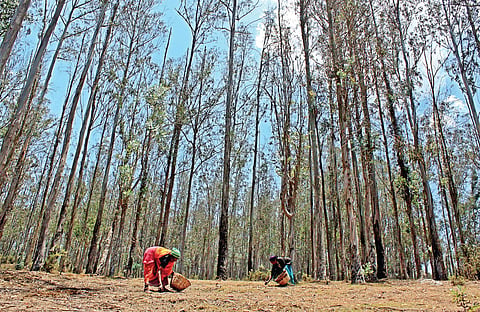

BENGALURU: The state forest department is undertaking the task of uprooting old eucalyptus trees from government and forest lands in the state, after obtaining permission from the Central government. Though this exercise has already started in some forest and grassland patches, including Ranebenur Blackbuck Sanctuary, it will be extended to other forests and cities, including Bengaluru and its surroundings.
A senior forest official told The New Indian Express, “Uprooting of eucalyptus trees is being made a part of the working plan of each forest division. The purpose of doing this is to improve natural vegetation and also make way for indigenous species.”
In case of Bengaluru and its surroundings, around 75 acres have been identified. Old eucalyptus trees will be removed from forest patches, including Turahalli minor forest. Some activists have opposed the decision, citing it as part of the green cover of the state. They also pointed out that strong objections were raised when the forest department and Bangalore Development Authority (BDA) had taken a decision to clear eucalyptus trees for the National Military Memorial in Bengaluru.
However, many other conservationists said it is a good idea. Noted environmentalist and former forest official AN Yellappa Reddy said eucalyptus trees were introduced in the country in the 1950s when a foreign industrialist had suggested to the government to plant eucalyptus, reasoning that it is a fast-growing species and would help meet the demands of the pulp, paper and rayon factories.
Eucalyptus was promoted instead of bamboo which was termed to be a slow growing species, underplaying its ecological value.
Reddy stated that eucalyptus was introduced in Nandi Hills in the 17th century and after this a hybrid variety had evolved, called Mysore Hybrid, which the state government promoted and farmers also started growing for quick returns.
“Over time, it has been realised that this has led to no grass, no soil rejuvenation, and no humus in soil. It was understood that eucalyptus trees suck up all the water and affect groundwater levels. Realising that it is not good for the ecosystem, the forest department has taken this decision. Instead, emphasis should be laid to ensure indigenous species are planted and the ecosystem is maintained,” he added.